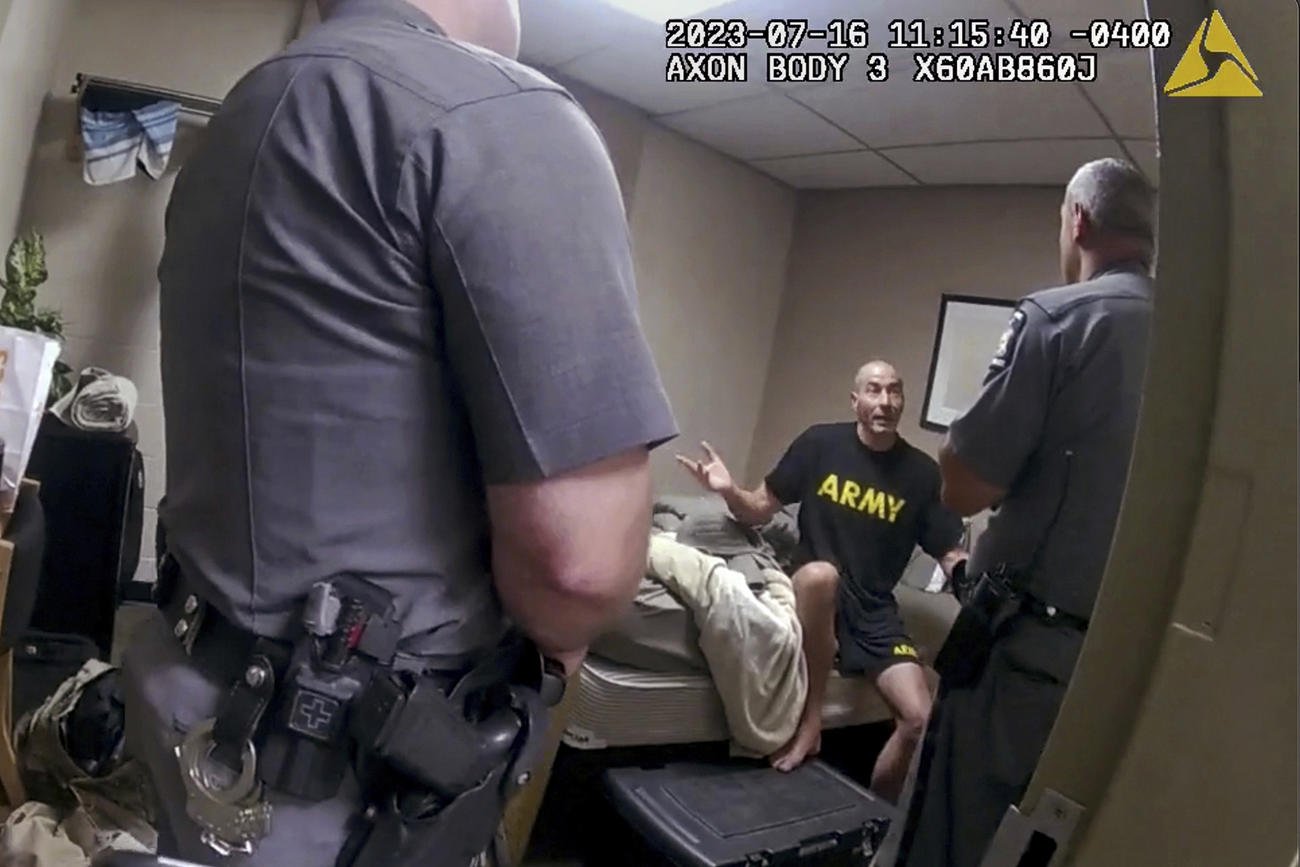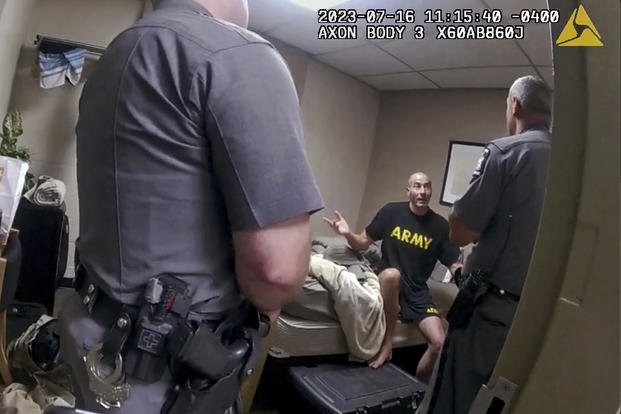

Maj. Matthew Dickison accepted Robert Card’s claim that he was not planning on hurting himself or others. But the Army reservist’s paranoid behavior and agitation over the course of an hour-long psychological evaluation last summer concerned Dickison enough to recommend that Card be kept away from guns.
“I’m afraid of what I may do if people still keep bothering me about the so-called voices that I’m hearing,” Card told Dickison, according to a report discussed Thursday during a public hearing before the commission investigating last October’s mass shooting in Lewiston.
Dickison, a nurse practitioner who was temporarily assigned to Keller Army Hospital in New York last summer, offered some new details about Card’s evaluation and treatment after he attempted to attack a fellow soldier during their unit’s annual training last July. Card received an initial assessment at Keller before being transferred to a private hospital.
Dickison said Card was never actually involuntarily committed, as previously reported, though staff at the private hospital, Four Winds Psychiatric Hospital, had planned on committing him before abruptly changing course and discharging him for unknown reasons. Dickison attempted to use New York’s SAFE Act to temporarily seize Card’s weapons following his hospitalization, but gave up when it appeared the law could only be used on New York residents.
But the hearing left open many questions about what exactly took place during Card’s two weeks in the New York hospitals and who knew what about his care. A second witness who was scheduled to testify Thursday under a subpoena and who may have clarified the confusing relationship between Army providers and civilians who contract with the Army did not appear.
Patricia Moloney, a “civilian medical professional” who contracted with the U.S. Army was supposed to appear before the commission remotely at 1 p.m. But Moloney was not on the call when the commission members appeared after a 10-minute delay.
Anne Jordan, a staff member who assists the commission, explained that the group has made numerous attempts over the past five weeks to reach Moloney through contacts in the Army and Moloney’s civilian employer. Army staff have been especially helpful, Jordan said, but because Moloney is a civilian they have not been able to order her to appear before the commission.
Jordan said she was told to contact Cody Blatt, who told Jordan that he worked for a venture capital group and confirmed that they had received the subpoena for Moloney’s testimony. He promised to talk to Moloney’s attorney, but that conversation never happened, and he did not respond to voicemails Jordan left afterward, she said.
Witness Fails to Appear
Blatt said that Moloney was the subject of a potential malpractice claim, and that’s why she wouldn’t speak before the commission, Jordan said.
“We will refer her failure to appear today to the (Maine) attorney general for whatever action may be appropriate,” commission Chair Dan Wathen said.
Moloney, who is listed as a staff member and licensed clinical social worker on the Army’s psychological health program website, did not answer a voicemail Thursday seeking to discuss her absence.
Dickison’s role in Card’s treatment already had been discussed before the commission during the occasionally tense questioning of Card’s commander, Capt. Jeremy Reamer. When given an opportunity to share his side of the story Thursday, Dickison said his role did not go much beyond what Reamer had described.
Dickison was called in to evaluate Card the morning after the soldier came to believe his friend Daryl Reed was insulting him while they were making a quick run for beer and pizza, even though Reed was sitting in complete silence. Card tried to punch Reed, then retreated back to his bedroom and refused to open his door for the superiors who went to check on him.
During the evaluation, Card repeated the claims that his family and friends had already gotten used to hearing: people all around him were saying he was gay and a pedophile.
Dickison determined that Card was suffering from psychosis and immediately recommended he be transferred to Four Winds, a nearby civilian hospital, for further evaluation. He also passed along a series of recommendations to Reamer, including that he make sure Card attended his follow-up appointments and that Reamer take steps to confiscate Card’s personal firearms. During a follow-up conversation to ensure Reamer understood the recommendations, Reamer never gave any indication that he wouldn’t be able to do these tasks, Dickison said. But Reamer has since repeatedly told the commission that he had no authority over his soldiers except on drill weekends.
“I wanted to do my due diligence,” Dickison said. “I assumed that the commander was going to follow these recommendations.”
Treatment Details Obscured
What happened once Card got to Four Winds remains unclear. Questions asked by the commission suggest that the staff at Keller had access to medical records from Four Winds and that an Army case manager knew about Card’s discharge. A little more than a week later, the case manager talked to Card and learned that he had stopped taking his medication because he didn’t like the way it made him feel. But Dickison said he had no role in Card’s follow up care, and it’s not apparent whether anyone else in the Army took any additional steps after Card announced he was going off his medication.
Though several previous hearings have detailed attempts to address Card’s declining mental health at key moments in May, July and September, many facts about Card’s hospitalization have remained elusive.
Administrators Four Winds have not responded to several messages asking to discuss Card or the hospital’s involuntary commitment practices more broadly, and the only medical records released to the public have been so heavily redacted that they are unreadable.
Even Card’s family members have said they have had limited access to his medical records and don’t know much about his treatment last August.
Once Card was transferred to Four Winds, a civilian hospital, it became difficult for either the Army or Card’s family members to get details about his treatment, members of both groups told the commission. According to Card’s sister Nicole Herling, their mother was the hospital’s main point of contact, but due to her own medical conditions, she was not fit to convey how concerned the rest of the family was about Card’s declining mental health.
Upon Card’s release from the hospital, it was immediately apparent to his friend Sean Hodgson and his family members that his condition had not changed.
This story is part of an ongoing collaboration with FRONTLINE (PBS) and Maine Public that includes an upcoming documentary. It is supported through FRONTLINE’s Local Journalism Initiative, which is funded by the John S. and James L. Knight Foundation.
(c) 2024 the Portland Press Herald (Portland, Maine)
Visit the Portland Press Herald (Portland, Maine) at www.pressherald.com
Distributed by Tribune Content Agency, LLC.
© Copyright 2024 Portland Press Herald, Maine. All rights reserved. This material may not be published, broadcast, rewritten or redistributed.
